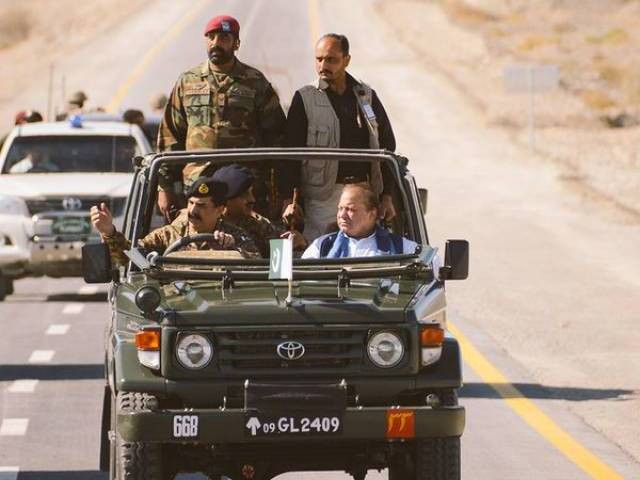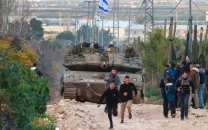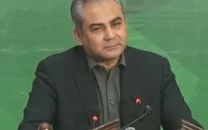Army supportive of democracy: FO
Islamabad likely to take up issue of F-16 deal with visiting US delegation on Saturday

PHOTO: ISPR
In response to Indian Prime Minister Narendra Modi's recent statement, the spokesperson said no wedge could be drawn between the civil and military leadership of Pakistan as the latter was committed to the democratic process.
"The armed forces remain committed to support the democratic process in Pakistan," he said. when asked to comment on Modi's statement where he said it was hard to decide whom to talk to in Pakistan on peace process - whether to the democratically elected government or 'other actors'.
Who do we talk to in Pakistan to decide red lines, asks Modi
"We remain open for dialogue. Pakistan will be ready for talks when India will be ready," the Foreign Office spokesperson said during his wekly press briefing in Islamabad. Zakaria said Pakistan considered dialogue as the best way to resolve issues with India and had taken several initiatives in the past.
Indian Prime Minister Narendra Modi has said it is hard to decide who to speak to about peace in Islamabad. “The first thing is that with whom in Pakistan will you decide the ‘lakshman rekha’ (redlines) – with the elected government or with other actors?” Modi said in his first interview to a private Indian media since becoming prime minister in 2014.
“That is why India will have to be on alert all the time. India will have to be alert every moment. There can never be any laxity in this,” he told Times Now editor in chief Arnab Goswami on Monday.
F-16 deal
Pakistan on Thursday said the option of buying F-16 fighter jets from the United States is still open. The statement comes ahead of the visit of a high-powered American delegation led by former presidential candidate John McCain on Saturday.
Sale of F-16s: Pakistan concerned over blocked funds
“In diplomacy, we never say the doors are closed,” said Foreign Office spokesperson Nafees Zakaria when asked whether the option of buying F-16s was still open or now a closed chapter. He explained that the US in principle approved the sale of fighter jets but the issue was about financial arrangements. The deal ran into trouble after the US Congress Committee on Foreign Affairs stopped the Obama administration from subsidising the sale of F-16s to Pakistan.
Previously, Islamabad was supposed to pay only $270 million while the Barack Obama-led administration was to pay $430 million in subsidy through the US foreign military financing budget for the fighter jets. The deal eventually lapsed last month after Pakistan failed to notify the US administration about its plans to go ahead with the F-16 procurement.

The spokesperson said the purpose of the sale was to help Pakistan in its counter-terrorism efforts. “Terrorism is not just Pakistan’s problem but a global issue, which requires a cooperative approach. The purpose was to enhance Pakistan’s precision strike capability,” Zakaria told reporters at the weekly briefing.
Pakistan-US relations on downward slide: Sartaj Aziz
Security officials said F-16 fighter planes played a crucial role in dismantling the terror infrastructure in the tribal areas.
Pakistan is expected to raise the issue when US delegation led by head of the Arms Services Committee Senator John McCain arrives in Islamabad on Saturday. Other members of the delegation include Republican House member Ric Davis, Senator Lindsay Graham and Senator Joe Donnelly. The US delegation is scheduled to meet PM Adviser on Foreign Affairs Sartaj Aziz and army chief General Raheel Sharif.
Quartet is not ‘dead’
The spokesperson dismissed the perception that four-nation peace initiative known as Quadrilateral Coordination Group (QCG) was now dead after the killing of Taliban chief Mullah Mansoor in US drone strike.
“All members of the QCG have continued to reiterate that they are committed to the QCG process. Pakistan is serious and sincere about peace and stability in Afghanistan. We will be ready to assist the QCG process whenever the Afghan government is ready,” he added.
About Pakistan’s influence on the Afghan Taliban, the spokesperson explained that influence was not ‘mathematically measureable or a one plus one issue.’
Pakistan has other options if US cancels F-16 deal, says Asif
“The situation in Afghanistan that you see today has a history that dates back to the events of 1979. You will have to understand the whole background of the scenario which you see today and with regard to the role which Pakistan is expected to play towards peace and stability in Afghanistan,” Zakaria argued. He said other countries also saw Pakistan as a vital country to play an important role in peace and stability in Afghanistan.
“In the QCG, there are four members, one of them is Afghanistan and the other three are facilitators. These three along with Afghanistan have influence on various factions to varying degree who we want to bring to the negotiating table. This requires a collective effort. It is not any one country’s responsibility,” he stressed.
Published in The Express Tribune, July 1st, 2016.



















COMMENTS
Comments are moderated and generally will be posted if they are on-topic and not abusive.
For more information, please see our Comments FAQ